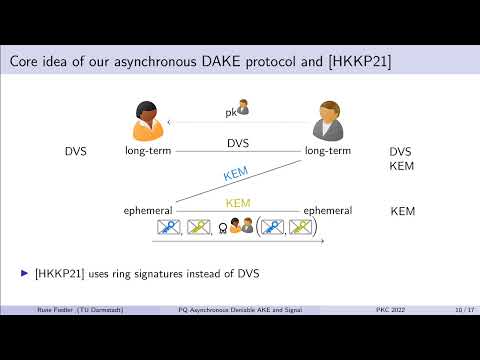CryptoDB
Post-quantum Asynchronous Deniable Key Exchange and the Signal Handshake
| Authors: |
|
|---|---|
| Download: | |
| Presentation: | Slides |
| Conference: | PKC 2022 |
| Abstract: | The key exchange protocol that establishes initial shared secrets in the handshake of the Signal end-to-end encrypted messaging protocol has several important characteristics: (1) it runs asynchronously (without both parties needing to be simultaneously online), (2) it provides implicit mutual authentication while retaining deniability (transcripts cannot be used to prove either party participated in the protocol), and (3) it retains security even if some keys are compromised (forward secrecy and beyond). All of these properties emerge from clever use of the highly flexible Diffie--Hellman protocol. While quantum-resistant key encapsulation mechanisms (KEMs) can replace Diffie--Hellman key exchange in some settings, there is no KEM-based replacement for the Signal handshake that achieves all three aforementioned properties, in part due to the inherent asymmetry of KEM operations. In this paper, we show how to construct asynchronous deniable key exchange by combining KEMs and designated verifier signature (DVS) schemes. There are several candidates for post-quantum DVS schemes, either direct constructions or via ring signatures. This yields a template for an efficient post-quantum realization of the Signal handshake with the same asynchronicity and security properties as the original Signal protocol. |
Video from PKC 2022
BibTeX
@inproceedings{pkc-2022-31695,
title={Post-quantum Asynchronous Deniable Key Exchange and the Signal Handshake},
publisher={Springer-Verlag},
author={Jacqueline Brendel and Rune Fiedler and Felix Günther and Christian Janson and Douglas Stebila},
year=2022
}

